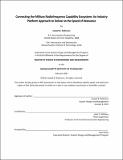Connecting the military radiofrequency capability ecosystem : an industry platform approach to deliver at the speed of relevance
Author(s)
Robinson, Joseph B. (Joseph Brian)
Download1263358511-MIT.pdf (12.01Mb)
Other Contributors
Massachusetts Institute of Technology. Engineering and Management Program.
System Design and Management Program.
Terms of use
Metadata
Show full item recordAbstract
The 2018 United States (U.S.) National Defense Strategy identifies the critical need for the U.S. Department of Defense (DoD) to "deliver performance at the speed of relevance." This thesis asks the question of "how" the U.S. military can deliver radiofrequency (RF) spectrum capabilities at the speed of relevance. RF capabilities provide critical DoD functions and are increasingly important for military operations. However, the RF spectrum continues to become more congested and contested; military capabilities must continue to perform in a growing Volatile, Uncertain, Complex, and Ambiguous (VUCA) world. This thesis explores military and industry stakeholders' current systemic challenges in rapidly delivering RF systems. A combination of literature review, stakeholder interviews, and a web-based survey are used to analyze the RF capability ecosystem. The thesis 1) presents a set of challenges identified to "deliver [RF capabilities] at the speed of relevance" and 2) evaluates how an industry platform approach can address these challenges. Stakeholder interviews and survey results show that most problems are based on challenges in acquisition, knowledge, and the use of standards. Additionally, the results show that though nearly all respondents identified value in transaction (97%) and innovation (99%) platforms, the value delivered in the web-based survey was not sufficient to generate network effects. Ten industry platform use cases are analyzed with a final recommendation to test the platform strategy through a hybrid industry platform prototype focused on delivering flexible, multi-function RF capabilities.
Description
Thesis: S.M. in Engineering and Management, Massachusetts Institute of Technology, System Design and Management Program, February, 2021 Cataloged from the official version of thesis. Includes bibliographical references (pages 201-209).
Date issued
2021Department
Massachusetts Institute of Technology. Engineering and Management ProgramPublisher
Massachusetts Institute of Technology
Keywords
Engineering and Management Program., System Design and Management Program.